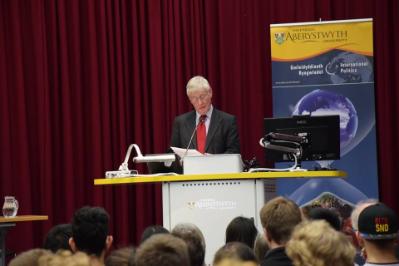2016 DDMI Annual Lecture – Lord William Wallace
22 February 2016

On Thursday, 4 February 2016, the David Davies Memorial Institute hosted its Annual Lecture. Lord William Wallace, a distinguished expert in international affairs, delivered a talk titled Losing the Narrative – The United Kingdom and the European Union. Having held prestigious positions at Chatham House, the University of Oxford and the London School of Economics, among others, Lord Wallace combines the experience of a top academic with that of an accomplished politician. He is therefore ideally placed to address the issue.
Lord Wallace analyzed the European Union as an imagined community, the identity of which emerged out of an appreciation of otherness and a sentiment of communal feelings. In the early years, he argued, the European nations were linked by their common experience of the Second World War. This nourished the sense of being a community of fate. The British post-World War identity narrative was inherently bound to the Anglo-American alliance, the defence of democracy and civilisation. In line with this tradition, the United Kingdom sought to maintain unique influence within Europe, in the Commonwealth and in the relationship with the United States. As Lord Wallace explained, ‘we knew who we were.’ Britain’s integration into the EU after the end of the British Empire in the 1960s was accompanied by hopes of reviving its economy. However, the British economy continued in its decline. The social dimension of the globalization became evident. The gap between the poor and the more privileged increased. Under the Prime Minister Margaret Thatcher, the British narrative reverted to the one modelled after the Churchullian precedent of exceptionality. Following the Falklands War it depicted a strong Britain and a weak continent. Nevertheless, internally the sense of solidarity disintegrated. People lost ties to their imagined community just as the EU politics and the growing effects of the globalization began to be experienced in their daily lives. The more privileged began to establish cross-border and cross-national ties, whereas the poor and the unskilled were confined to their local communities. Although Lord Wallace sees the European Union as the best institution to moderate the impacts of the globalisation on the economy, the EU’s legitimising narrative of economic growth was seriously challenged by the 2008 economic crisis and its aftermath. Today, the British neither know who they are, nor where they want to go.
A vidcast of the 2016 Annual Lecture can be found HERE. A full written text of the lecture will appear in the journal International Relations. The Annual Lecture and other activities of the DDMI are kindly supported by the Gwendoline and Margaret Davies Charity. We should like to express our thanks and gratitude for the continued support
Back to the top
